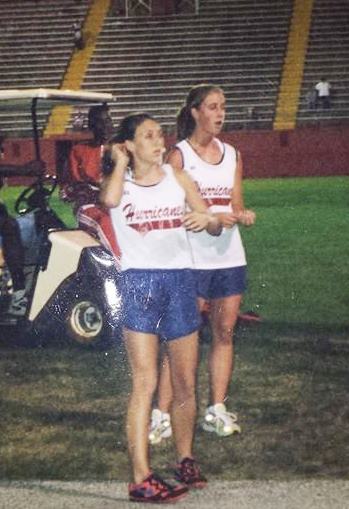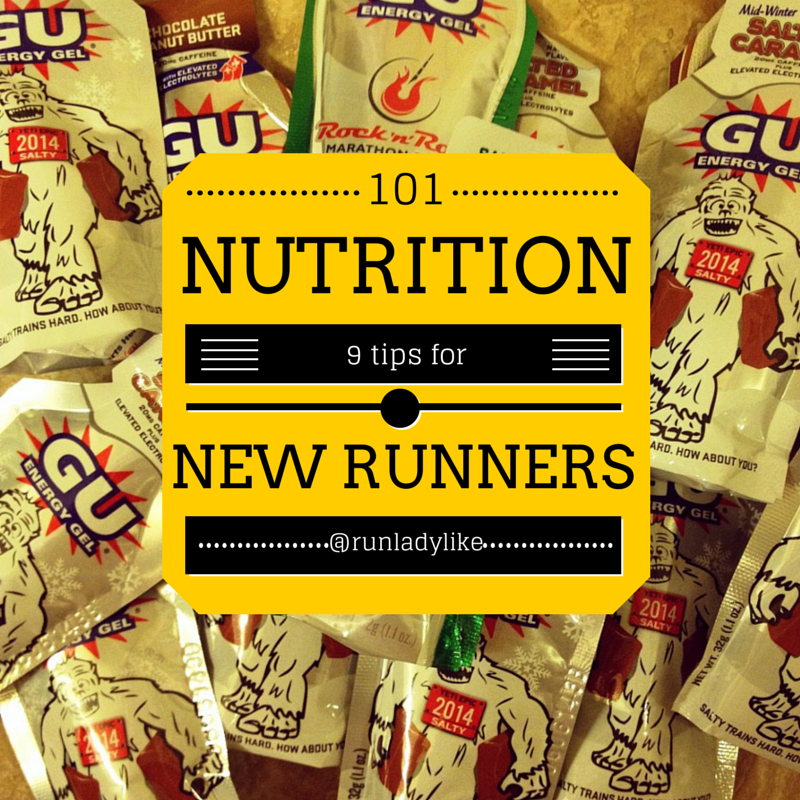Nutrition for New Runners
Running has been a part of my life forever. Literally. I have no memories as a human being without running thanks to my dad who was an elite track athlete and then a running coach for years. Although running was always a focal point in my life and something I excelled at as a kid, it wasn’t until 2009 that I started running long distances.

As a sprinter growing up and a typical gym-goer throughout college and in the years following, I ran, but knew nothing about running nutrition or fueling. People eat while running races? Yes, it was an entirely new learning curve when I first entered the world of endurance running – a world that now is so comfortable it feels like home.
After 5+ years of running marathons, long distance triathlons and everything in between, it’s hard for me to remember there was a time I couldn’t name an endurance fueling product on the market, let alone understand how to use it to optimize performance. Truthfully, it took me about 3+ years to figure out the nutrition strategy that works best for me. I experimented with just about everything. I was constantly asking successful runners for their secrets until I figured out my own “silver bullet.” And I trudged through many horrific runs and races before hitting my nutrition and fueling stride.
Last week, a friend and runladylike.com reader reached out to me and reminded me about how confusing and lost runners can feel on the topic of nutrition when they’re just starting out:
“Jesica, I’m running 11 miles tomorrow and was told to get refueling options, which leads me right to confusion. I was told to get something and experiment with different things. The lady at my local running store gave me some tips, so I ended up with [2 different kinds of running chews]. If you have any advice, I’d love it!”
This awesome lady is training for her first half marathon (likely somewhere around a 2:15 pace) and never realized that fueling during her run could boost performance. Yikes! It got me thinking about how many other runners are out there training for their first big long distance race, feeling lost and nervous and shy to ask questions that more experienced runners consider common knowledge.
So today, we’re getting back to basics. Certainly, a race day nutrition strategy should be part of a larger, everyday nutrition strategy that focuses on achieving a balanced diet based on whole, unprocessed and mainly organic foods, including quality lean protein, whole grains, complex carbohydrates, nuts and a lot of fruits and vegetables. Since preparing for race day and fueling while running seem to hold the biggest mystery for new runners, I’m focusing on that element today.
I am not a nutrition expert or a health care provider, so my tips are based on years of experience for what works for me and other runners I train with and coach.

1. Hydrate early and often: You want to hydrate all week before a long run or race (and of course all week every week as a runner). Thursday through Saturday before a Sunday race/long run are especially important days. Drink lots of water during this time. You know you are hydrated when you’re peeing about every 2 hours and your pee is nearly clear (like watered down lemonade). Don’t overdrink, just until your pee is the color of straw.
2. Hold the fiber: The day before a long run or race, avoid foods that are high in fiber which take longer to digest and can cause stomach issues for some runners. Things like beans, green leafy vegetables (think broccoli, spinach, etc.), whole wheat grains, etc. should be temporarily avoided the day before and the morning of a race or long run. While some runners choose to fuel with natural foods like dates, raisins, etc., I find that they have too much fiber and can cause unwanted stomach issues for some runners. When in doubt, hold the fiber until after your big run.
3. Eat the right dinner: The night before a long run or race, eat a meal with protein and carbs. Some runners like to eat pasta, but I typically have a bowl of pasta with grilled chicken for lunch and stick to a chicken breast, baked potato and rice with a roll for my pre-race dinner. Adding extra salt to your meal is a good idea.
4. Have a breakfast of champions: The morning of your long run or race, eat a mixed meal that includes carbohydrates and protein 2.5 to 3 hours before you run to help ensure proper digestion and adequate time to go to the bathroom so you don’t experience stomach issues on the course. The idea with your breakfast is to top off your glycogen stores after your night of sleep, since glycogen is what the body needs to perform during endurance races. This may mean waking up, eating and going back to sleep until you need to get up to run. I recommend eating a mix of protein and carbs. The breakfast I consume and recommend to the athletes I coach is a bagel (an everything bagel is my choice), 1 to 2 hardboiled eggs with salt, berries and a salt pill. Depending on your weight, you may need to eat slightly more or less. The key is to eat it about 3 hours before you start running.
5. Remember the 1-hour rule: I like to stop drinking fluids 1 hour before my race start, with the exception of a small sip or so to take in my pre-race fuel (see below). This can help prevent needing to pee minutes before the race start or early on during the race.
6. Eat again before the start: On race morning, consume about 100 calories of fuel about 30 to 35 minutes before the race or immediately before your warmup. This should be completely carbohydrate-based (no fiber, protein, etc.), such as one gel, 100 calories worth of chews, etc. Consume this with a small sip of water. I personally prefer black cherry Clif Shot Blocks for this, although gels/GUs also work well.
7. Eat and drink to maximize performance: This is where many new runners need the most help and guidance. Consider your long training runs your dress rehearsals for race day, where you experiment with products to see what works for you and practice your fueling strategy. Here are a few things to keep in mind:
- During your race, aim to consume 30 to 60 grams of carbs per hour of exercise, and fuel BEFORE you feel out of energy. I prefer GU brand gels for this and personally really like Salted Caramel and Salted Watermelon flavors. There are numerous products on the market (Clif Shot Bloks, Honey Stinger gels and chews, Power Bar gels and chews, mixed sports drinks, Huma gels, Vega gels and the list goes on and on.) The key is to stick with as close to liquid form as possible and something that will absorb into your blood stream the quickest. As a note, trying to consume solid foods while running gets harder as the miles go on. Something you can swallow quickly will be much more appealing toward the later stages of a race.
- You should only consume GUs or your fuel of choice with water (not sports drink), and you want to be sure you take your GUs during the race when you’re going to be able to wash them down with water (near a water station).
- Every 40-45 minutes is a good cadence that seems to work well for taking in gels, chews or GUs.
- To get your extra carbs and calories to round out your nutrition, I recommend alternating between water and Gatorade/sports drink at the aid stations during the race. An additional 6 to 8 ounces of sports drink every couple miles will do wonders to help you maintain your energy levels and pace during a marathon in particular. Drinking at every aid station along the course should ensure that you will be adequately hydrated. If you’re out on a long run carrying your own fuel, aiming to drink between 8-15 ounces every 30 minutes is a good rule of thumb. In hotter temperatures you may need more. Learn more about how much you sweat and how much you should drink here.
If you are running a half marathon in 2 hours or less, one gel/GU along with sports drink along the course will likely be adequate. I actually ate 5 GUs (an all-time high) in my last marathon during the 3 and a half hours I was out on the course because I felt like I needed the extra energy to maintain the faster paces I was running. Again, experimenting during training will help you determine what frequency and brands work best for you.
8. Don’t forget the salt! As a new runner, you will start to hear a lot about electrolytes. These are chemical substances like sodium, potassium, chloride and bicarbonate that are essential for the normal function of your cells. When you choose gels/chews/GUs and sports drinks, you want to ensure they contain electrolytes to help replenish lost sodium and potassium. During warmer weather months, you may also want to experiment with ingesting salt pills along with your fuel. Salt pills can help you keep your electrolytes balanced by consuming 1 per hour. You can pick these up at your local running specialty store. As someone who runs and trains in a very hot and humid city, I always carry salt pills with me on long runs during the summer.
9. Eat within 30 minutes of finishing: You know that saying “you are what you eat?” Well, it has never been truer when it comes to race recovery. That’s because you can jump start your recovery by eating within 30 minutes after a hard workout or race. The important thing to focus on is getting the right mix of carbohydrates and protein, even if you don’t feel like eating right away. Experts recommend consuming 30 to 40 grams of carbohydrates and 10 grams of complete protein, preferably in an easily digestible form and continuing to hydrate. A smoothie is a great option with fruit and protein powder.
What additional tips would you add to this list about nutrition for new runners? If you are a new runner, what additional questions about nutrition do you have that our community can help you answer?



Comments
Isn’t it amazing how much we’ve learned along the way? I remember (vividly) some of the mistakes I made in my early training/races. This is a great post for anyone new to the great sport of running!!
I’m not a “new” runner, but you never stop learning, right? Great tips, as usual.
I already followed your advice and added some protein the day before a long run, it works!
Does a slow runner need less fuel during the marathon?
Hi Gabrielle! Thanks for your kind words and I’m glad some of my tips are already working for you! Regarding fuel, slower runners actually likely need more based on running for longer periods of time. Use the time guidance of carbs and calories per hour as you test things out and see what works for you. For instance, a 1:30 half marathoner may only need one GU or even just sports drink, while a 3-hr half marathoner probably needs to fuel up 3 times due to the length of time running to replace glycogen stores.
Great tips! before a race, I always eat a carb-heavy breakfast first thing in the morning, travel to my race, and take a ClifShot right before the start. Then I fuel about every 8 miles or so.
Thank you so much, Jesica! I’ll let you know I will perform !
Great tips for runners! I love Generation UCAN for recovery and for prerace fuel. It worked really well on my 20 milers, but marathon race day I kind of broke all the rules (unintentionally) I did what had worked for me during my 20 miler race, but it didn’t work for the marathon. I had to pee and took two potty stops.
nice summary! What are your thoughts on caffeine pre race? And how about the long lasting superstarches like Ucan? I find it is ok for long slow workouts (1-3 hrs) but doesn’t seem to be enough alone for races.
Hi Steve. Thanks for reading and for your questions. I’m not a big coffee drinker, so I typically don’t drink coffee before a race, but I do use fuel that has caffeine in it. Probably the best thing about coffee pre-race is that it aids in the pre-race bathroom-going 🙂 I have talked to a professional endurance nutritionist about caffeine and he told me that there are definitely benefits to pre-race caffeine, but typically after you have not consumed any caffeine for 7-10 days before the race. Everyone is different, so I think you have to experiment and see what works for you. I use the Clif Shot Bloks and GU with caffeine in them. As for Generation UCAN, I have tried it and I think I like it. I prefer it for shorter runs like you mention … if I am going for a 6-10 mile run and need a little something before, especially if it is in the morning during a workday. But I haven’t found it to do better for me than the real food I eat before long runs, and I really hate that most of the flavors are sweetened with Splenda, which is just something I don’t want to consume. I hear the cranberry flavor doesn’t have Splenda in it, so I’ll have to check that out. I like the Vega Sport Energizer for a pre-6-8-mile run as well. Good luck!
Great post! Thanks for breaking it down.
What a great post! This came at the perfect time for me. Thanks so much for sharing your knowledge!
I’ve recently been struggling with my running. It seems to hit anywhere between the 7-10 mile mark. I used to be able to do this distance comfortably without fuel (other than water) but in talking to one of my coaches at the gym and my massage therapist, it seems it could be that I’m lacking electrolytes. I don’t really ‘cramp’, but the muscles in my lower back and hamstrings get so tight that I can literally barely move. I turned to your blog on ideas for fuel and nutrition. When I did need fuel for anything over 13 miles I consumed Gu. However, I have been working on my overall nutrition and make an effort to eat clean and organic for a majority of my diet. It kills me to look at the ingredients in Gu/gel and know that I’m putting that in my body so I’ve been avoiding it but now it comes down to needing something so I can finish a run. I am going to try the ReplaceSR and, in the meantime, go back to Gu until I can find a healthier option that’s equally as convenient. Great to have a source to turn to!
Kimberly, Have you tried Huma gels? They are plant-based and a lot of runners like them. I personally feel that GU is more effective for performance but if you are just running 7-10 you shouldn’t need it. Sounds like you could definitely be depleted of magnesium and electrolytes will help. Also, you may want to get your Iron/ferritin levels checked.
Thank you, Jesica! I will look into the Huma gels and checking iron, appreciate the recommendation. I do think GU is effective and may just have to be okay with it on longer runs for functional purposes 🙂 Looking forward to trying the ReplaceSR that I ordered.